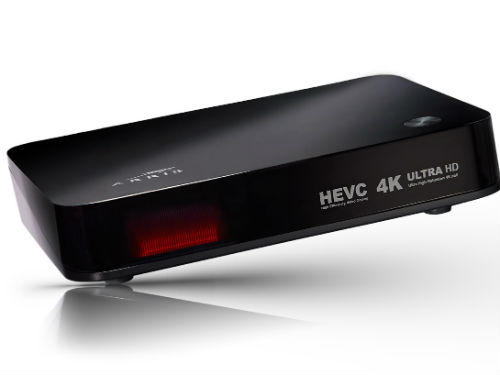Arris to Be ‘More Selective’ With Its Set-Top Box Business
The smarter way to stay on top of the multichannel video marketplace. Sign up below.
You are now subscribed
Your newsletter sign-up was successful

Arris turned in a generally solid Q4, but pressures being applied to its set-top business, driven in part by rising memory costs, is causing the company to adjust its strategy in a way that could have the company steering clear of less profitable opportunities.
“As we enter 2018, the team continues to sharpen the focus on enhancing economics within the CPE [consumer premises equipment] business, and we are taking a number of steps to improve efficiency,” Bruce McClelland, Arris’s CEO, said Wednesday on the company’s Q4 2017 earnings call.
One of those steps is to sell its set-top manufacturing facility in Taiwan to Pegatron. Once completed, Arris will be able to tap into Pegatron’s scale and supply chain, and yield an annual benefit of $20 million or more and lowering product costs, McClelland explained.
Arris is “in extensive discussions with customers to adjust pricing to reflect increased memory costs, and are being increasingly more selective on the projects that we pursue,” McClelland added, noting later that the adjusted selectivity will have Arris focus more on profitability than on sales growth.
That adjustment comes as video set-top sales in Q4 2017 declined 13% year-over-year amid lower volumes and the shift toward lighter-weight clients, trends that are emerging due to new gateway-client architectures and the expanding use of cloud DVR services.
McClelland said Arris expects the cost of memory to continue to be an issue for its CPE business, and is currently projecting another 10% increase in costs in 2018 relative to the fourth quarter of 2017.
“It’s a situation where we think we have to have these discussions with customers and find a path forward,” McClelland said. “It’s an extremely active dialogue across the board, and I think we'll be successful in finding a middle ground that works for everyone. If we can't on some pieces of business that just don’t look like they are long term the right place for us to be, I think you'll find us trim those out."
The smarter way to stay on top of the multichannel video marketplace. Sign up below.
Arris’s strategy to be more selective and focus on more profitable opportunities for its set-top box business is not out of the ordinary. Cisco Systems, which sold its CPE business to Technicolor in 2015, opted a couple of years earlier not to pursue business for low-margin set-top boxes, particularly in Europe.
On the positive side, McClelland said the upgrade cycle for boxes that support 4K video gained momentum in 2017 and is expected to accelerate this year, citing Arris’s recently announced deal to provide 4K-ready boxes to Bell Canada.
RELATED: 4K-Ready Boxes From Arris Part of Bell Canada’s MediaFirst Move
But generally speaking, Arris expects sales from its CPE segment to shift toward a higher mix of broadband devices (the company anticipates CPE sales to be down 4% this year as it adjusts its operational efficiencies and focuses on profitability and price adjustments).
McClelland said Arris will likely provide more perspective on that evolving mix during its investor conference, set for March 28 at The Westin New York at Times Square.
That shifting mix was reflected in Q4, as sales of broadband CPE in the period jumped 7% amid growing demand of advanced DOCSIS-based gateways. Of note, Arris shipped 1.6 million DOCSIS 3.1 units in 2017, representing a bit under 10% of total volume, McClelland said, adding later that D3.1 has begun to progress from trials to full-scale commercial deployments.
The challenge faced by Arris’s video set-top business was a relative blip when compared to just about every other aspect of its business.
Overall Q4 sales came in at $1.73 billion, on the high end of Arris’s guidance range, and close to expectations of about $1.74 billion.
Arris expects 2018 sales of $7.1 billion to $7.35 billion, and earnings per share of $2.80 and to $3.05. That compares with consensus of $7.26 billion and $2.92 EPS, according to Raymond James analyst Simon Leopold, who maintained a “Strong Buy” on the stock and a target of $36.
Q4 numbers included a month of enterprise sales coming way of Arris’s acquisition of the Ruckus Wireless and ICX Switch business from Broadcom, a deal that, for example, will help Arris chase down new opportunities in the emerging CBRS market.
RELATED: CBRS Spectrum to Open Windows of Opportunity for Cable Ops
For that CBRS LTE portfolio, Arris has an active pipeline with traditional wireless service providers, wireline providers expanding into wireless, enterprise customers what are looking to deploy private, secure LTE networks, as well as wireless ISPs. Use of 3.5GHz CBRS spectrum for initial commercial trials are expected to start later this year, McClelland said.
That business [Ruckus] “hit the ground running,” McClelland said.
Arris’s projected increase of 9% in sales this year includes expectations that the company’s new enterprise business represents an opportunity in the $650 million to $700 million range.
Arris’s Network and Cloud business, meanwhile, saw profitability rise in part due to continued sales of DOCSIS capacity licenses for its flagship converged cable access platform, the E6000. Shipment of “Gen2” modules for the E6000 also accelerated in the second half of the year.
RELATED: Arris Touts Deployments of ‘Gen 2’ Modules for Flagship CCAP
He also noted that a portion of revenue projected for 2018 includes projects involving the use of Remote PHY, an emerging architecture that distributes certain electronics further toward the edge of the network.
